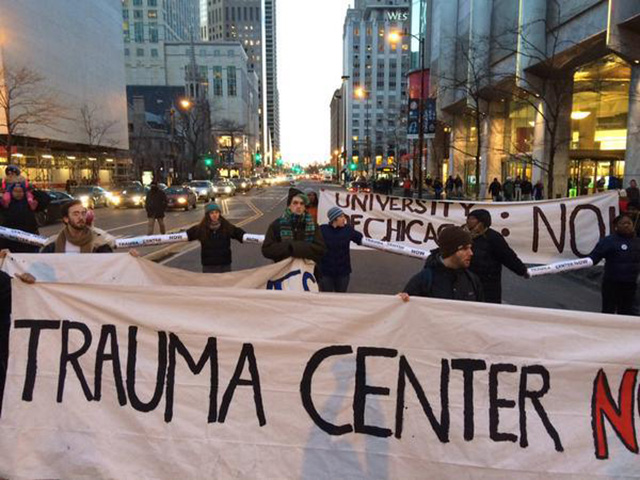
Did you know that Truthout is a nonprofit and independently funded by readers like you? If you value what we do, please support our work with a donation.
Chicago activists Veronica Morris Moore and Victoria Crider reflect on their participation in a direct action that shut down Michigan Avenue on March 5, 2015.
Veronica Morris Moore, Fearless Leading by the Youth:
As I try to compile a list of reasons why I was a part of the civil disobedience direct action that blocked northbound traffic on the Magnificent Mile on the night of Thursday, March 5, all I can immediately think of is “why not?” But for the purpose of this statement I’ll try to stick to reasons that are unique and relative to my role in the Trauma Center Campaign.
The main reason I volunteered my body for the human chain that blocked northbound traffic on Michigan Avenue is because I am committed to pressuring the University of Chicago to reopen its level 1 trauma center at the UChicago’s medical facility. Since Fearless Leading by the Youth began the fight to restore this vital service in our community, all our efforts have been met with is traditional racist excuses. UofC spokespeople say, “the service will be a significant burden that will undercut other services already provided to the community.” For me, a black queer youth (under 25), this is unacceptable.
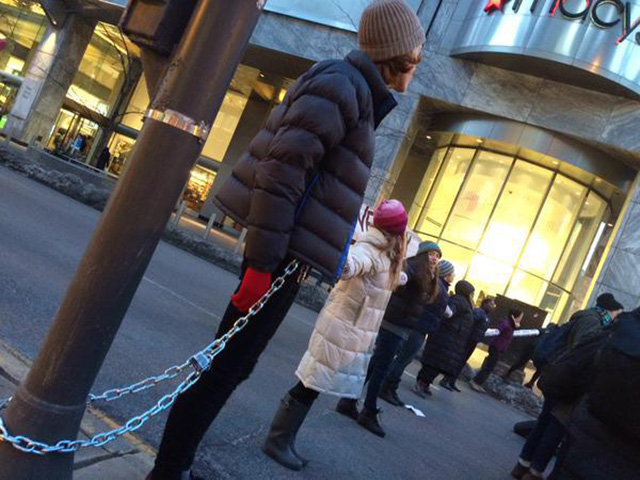 (Photo: Minku / @minkumedia)
(Photo: Minku / @minkumedia)
Another reason I participated in blocking traffic is because disenfranchisement is real and the University of Chicago needs to be called out for it. Too often filthy rich institutions, UChicago for instance, racially alienate poor people of color by avoiding issues that overwhelmingly impact black communities. The devastating amount of black lives that are lost along the 10 mile journey from the south side to seek trauma care, and the pain black families live with, are significant burdens that undercut our right to life as black people and the quality of our black families and communities we exist in. A trauma center would be less than 1% of the 4.5 billion dollar goal for the University of Chicago Campaign: Inquiry and Impact. What I understand when they, Sharon O’Keefe specifically, hide behind the financial undertaking of a trauma center is that to Sharon O’Keefe and company black lives don’t matter.
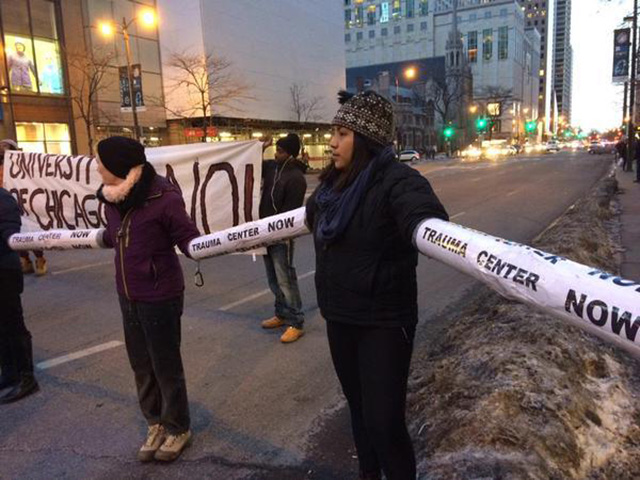 (Photo: Minku / @minkumedia)
(Photo: Minku / @minkumedia)
For me, the Trauma Center Campaign is about fighting for a fundamental way greedy white America, and all who benefit from, embody and reinvent white supremacy and structural racism, can be accountable (pay the fuck up) for the legacy of terrorism that seeks to kill black life and liberation. The University of Chicago and all of its elusive glory continues to grow and develop in my community without responding to the demands and real life needs of my community, the black community. I will not stop, nor will the Trauma Center Campaign ease up from, exposing the anti-black position Sharon O’Keefe has taken as a health provider in my community.
Victoria Crider, Fearless Leading by the Youth:
My nerves were on fire and the knot in my stomach tightened as the bus parked on Pearson Street. The atmosphere changed quickly from giddy and silly to focused and excited as we filed out of the bus, lockboxes on our arms and banners in our hands. Bystanders’ eyes were focused on us chanting “Trauma Center Now!” as we arrived to the corner of Michigan and Pearson. Five seconds later the light flashed from green to red and the rushing of the streets, the locking of the chains, the securing of the lockboxes happened in literally 10 seconds.
Whose streets? Our streets!
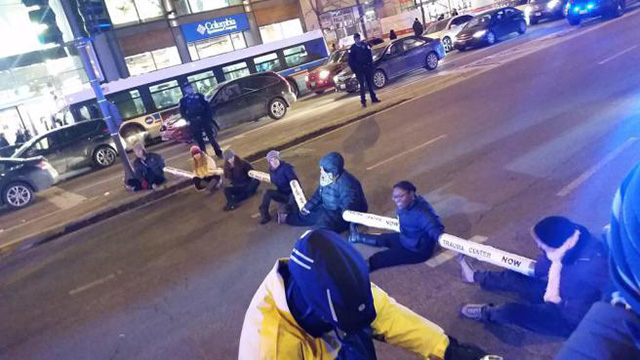 (Photo: Minku / @minkumedia)
(Photo: Minku / @minkumedia)
We stood with our arms in lockboxes chanting to the top of our lungs “Trauma Center Now!” as those who weren’t a part of the chain carried coffins, banners, signs. and helped us hold the street down. Onlookers recorded us, listened to us. After 30 minutes the police showed up to the scene and pushed everyone onto the sidewalk. Those of us in the lockboxes held our ground continuously chanting. Veronica kept her calm as she was in dialogue with the police officers letting them know that we weren’t leaving. After some threats from the officers we sat down making our point of staying very clear.
After the police announced to us that we were under arrest we disengaged from the lockboxes and stood with our hands up. The cold metal of the handcuff wrapped around my wrists and one by one we were led to the paddy wagon. After some disorganization from the police officers we were all placed in the paddy wagon and the door was slammed shut.
Who shut shit down? WE SHUT SHIT DOWN!
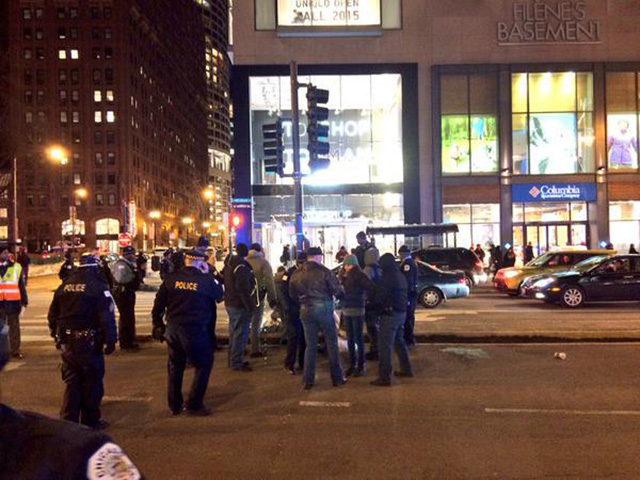 (Photo: Minku / @minkumedia)
(Photo: Minku / @minkumedia)
My time in jail wasn’t a wholly negative experience. I became closer to the amazing women I shared a cell with. We occupied the long hours with stories, laughing, remixing “Flawless,” discussing aspects of the campaign, fantasizing about food, and just having fun. The police officers were patronizingly nice. Veronica and I believe their consideration – giving us water, letting us go to the cleaner (for lack of a better word) bathroom, and not yelling at us as they did another inmate – was limited to our group, and probably had something to do with the fact that most of our arrestees were white and female. We all took a minute to sober to the thought that jail is usually a much darker experience.
For those that did not share a cell with us, Joe and Woody, jail was just that: worse. But that’s not my story to tell.
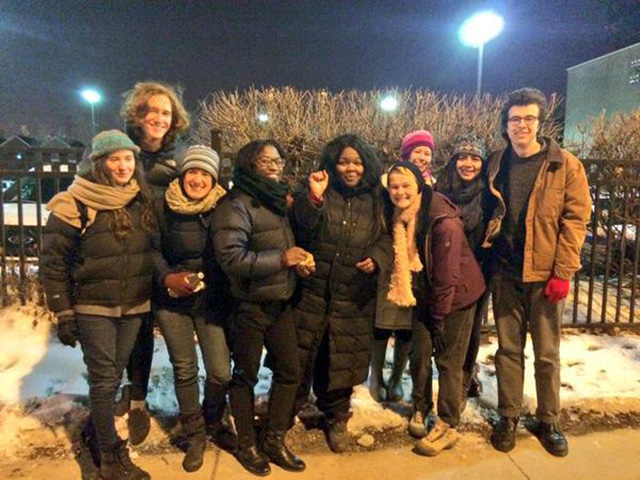 (Photo: Minku / @minkumedia)
(Photo: Minku / @minkumedia)
After the police fingerprinted us, took our mug shots, and I guess finally finished processing us they let us free a few at a time. In that moment, reclaiming my freedom was almost as great a feeling as the triumph of carrying out a complex action like blocking Michigan Avenue. Being able to go where I wanted, to do what I wanted, to hug those that waited in the lobby of the station for us, and to eat a lot of fried shrimp and fries – I can only describe it as being restored. Although this brief loss of liberty was made bearable by the great people I was surrounded with, jail is still jail. But I’d do it all again to emphasize the need for trauma care.
Matching Opportunity Extended: Please support Truthout today!
Our end-of-year fundraiser is over, but our donation matching opportunity has been extended! All donations to Truthout will be matched dollar for dollar for a limited time.
Your one-time gift today will be matched immediately. Your monthly donation will be matched for the whole first year, doubling your impact.
This matching gift comes at a critical time. As Trump attempts to silence dissenting voices and oppositional nonprofits, reader support is our best defense against the right-wing agenda.
Help Truthout confront Trump’s fascism in 2026, and have your donation matched now!